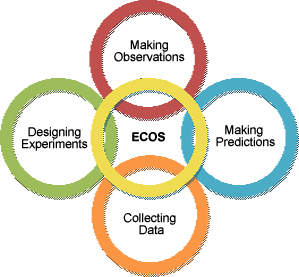
How do we know? and What do we want to know next?
By now, the bugs are buzzing and the blossoms are blooming…time for the ECOS Olympics! Students participate in a fun and fast-paced series of four “Olympic events,” inquiries designed to review and challenge students’ skills with the scientific method. In particular, students are given the opportunity to design fair tests for their predictions about when and where organisms will re-emerge around their schoolyards, and to brainstorm ideas on what they would like to investigate next, and how. For our final visit, we held an “ECOS Olympics” competition to review and challenge the skills that students had practiced throughout the year, and to leave teachers and their students with plans for what they wanted to investigate next about their schoolyards. Each “Olympic event” corresponded to a different step of the scientific method and was designed to fit within a 10-15 minute time period. Thus, we were able to conduct the entire Olympics in a 1-hour class period. For the first event, we modified the inquiry Pipe Cleaner Animal Camouflage (pdf format) to challenge students’ skills of careful observation. The second event involved students in making good predictions or hypotheses about insect habitat based on their prior knowledge. For the third event, students focused on collecting phenological data on emerging dandelions. For the fourth and final event, students designed simple experiments to answer their own questions about the ecology of their schoolyards, by selecting from a variety of independent and dependent variables.
|


